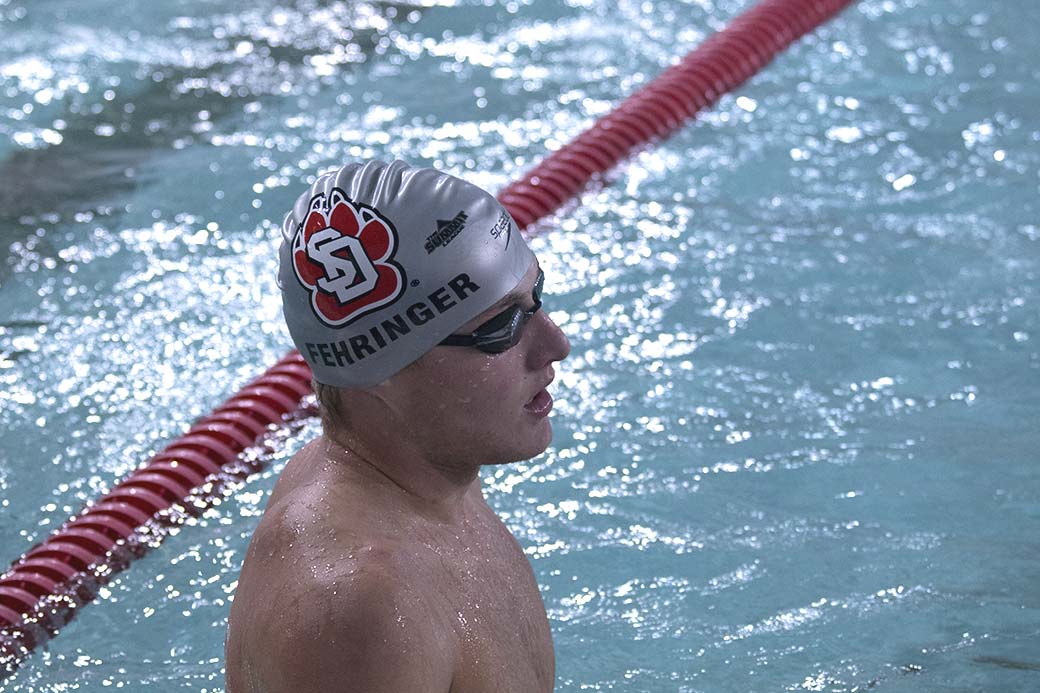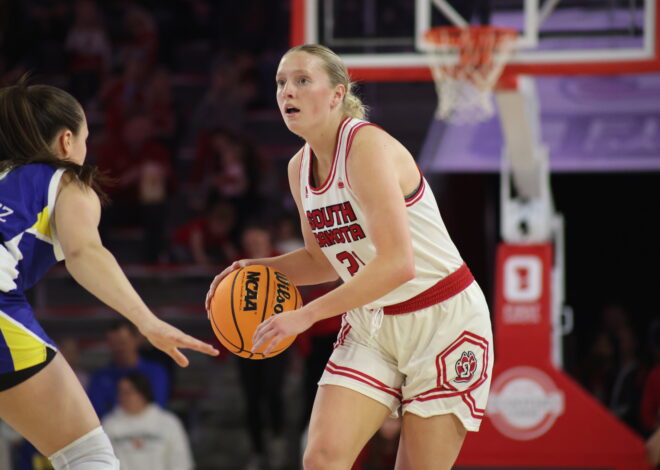
Confiding in a coach: USD swimmer feels supported after coming out as gay
After seeing the promise of a safe environment in a “You Can Play” video created by the athletic department in 2014, sophomore Bryce Fehringer was drawn to USD.
Fehringer wrote a blog post on OutSports over the summer about when he came out as gay to his swim coach Jason Mahowald. Since then, he’s received positive feedback from faculty and his peers.
Bryce’s story
A dedicated swimmer from Kersey, CO, Fehringer said the sport has taught him a lot and kept him grounded.
“Swimming has definitely taught me how to handle everything,” he said.
Fehringer said there’s stigma surrounding the LGBTQ+ community in his hometown.
“The community that I grew up in didn’t create the most positive image of the LGBT community when I grew up,” he said. “It was very stigmatized. It was so stigmatized that it interfered with my real worldview of how things were, and made me scared to acknowledge who I was.”
As he struggled with acknowledging his identity, Fehringer also faced bullying from peers and negativity in his school environment. He said he was afraid to stand up for himself because of how that action might be perceived.
“The way that I dealt with (bullying) is one of my biggest regrets,” he said. “I never really stuck up for myself or stuck up for anybody else when I would encounter bullying as a teenager and as a kid. If people are being homophobic, they’re going to assume I’m gay (if I stick up for myself) and then I’m going to get bullied even more.”
Fehringer said that coming out came in steps.
“It was really scary at first, but once I came to college and realized there’s a whole other world out there, that made it a lot easier for me to acknowledge it and accept myself,” he said.
At the time, Fehringer said he also struggled with his mental health.
“I had been struggling with some pretty significant depression and anxiety while I was in high school,” he said. “Whether you’re LGBT or not, that is a huge issue that is taking place. I wanted to talk to somebody.”
A coach’s connection
Fehringer found the solidarity and companionship he was looking for among his teammates at USD, but mostly in coach Mahowald. He said he felt most comfortable coming out to Mahowald first.
“The main reason why I wanted to tell Jason (Mahowald) first was because I knew he had previous gay athletes on his team, and I knew he was going to be supportive of me no matter what,” Fehringer said. “I wanted to have a good start when it came to the list of people that I had to tell about coming out.”
Mahowald said he remembers his first impression of Fehringer, and he knew his coaches all had great things to say about him.
“When he came on campus for his official visit, I was immediately impressed,” Mahowald said. “(Fehringer is) a smart, well-spoken, nice kid. We thought he’d be a perfect fit both athletically and academically here. We offered him a spot on our program and we’re lucky enough that he said yes.”
In Fehringer’s blog post, he wrote that when he came out to Mahowald, he simply replied, “Well, that’s okay, just as long as you invite my wife and me to your wedding someday.” This statement is what Fehringer said made him optimistic about the future.
Mahowald said this isn’t the first time an athlete has come out to him. He treats his student-athletes like they’re his own children, he added.
“I very much think Bryce looked at it as telling a parent,” Mahowald said. “I think my first (reaction) was happiness for him. The fact that he felt comfortable enough for me to be the first adult that he told makes me feel really good about the relationship that I have with my student-athletes.”
Other stories
Fehringer said it’s an important experience for LGBTQ+ people to come out.
“For a lot of gay people, no matter how they come out, it’s always a big deal for them because they’re so scared of what people are going to think,” he said. “I’m much happier of a person (now that I’ve come out).”
Eleni Knapp, a sophomore nursing major and a thrower for track and field, has a similar story. She said the women on the track team made it easier for her to come out as a lesbian.
“When I got to school, I just made the decision that I was going to come out and be who I was,” Knapp said. “It was definitely a lot easier being part of the track team because there were (a few) women on the track team that were already out.”
Knapp said it’s the little things that helped her feel accepted by her team.
“One weekend I was talking about all the plans I had with my girlfriend, and when I came back, all the guys were asking how it went,” she said. “I feel like that means a lot because they cared about whatever was happening with me, regardless of if it was something gay.”
Sophomore thrower Laurel Ketelhut said that being a lesbian is not a “big deal,” and that she hasn’t been treated differently for her identity.
“There really isn’t anything too hard about it,” Ketelhut said. “Everyone’s accepting. People making a big deal (out of it) is really the only thing. My teammates treat me just like everyone else. People have a lot more love and compassion in them than you realize.”
Senior accounting major and thrower Alli Lake agreed that her identity doesn’t need to be a “big scene.”
“It’s not worth getting consumed over,” Lake said. “Once you accept yourself, you begin to not look at other people and wonder what they are thinking. Coming out wasn’t really a huge thing for me because I didn’t think that it needed to be. It wasn’t acknowledged because it wasn’t a thing we felt like had to be acknowledged.”
Mahowald said he hopes coming out won’t be as big of a story in the future.
“For me, I hope at some point that this isn’t an article, that it isn’t a news story,” Mahowald said. “I hope at some point we get to the point of society where it’s not a news story that a Division I athlete came out and said they were gay.”
Although it’s important to come out, Fehringer said his identity as a gay man doesn’t really matter.
“It really isn’t that big of a deal at all,” he said. “I think that at the end of the day, it really is just all about who you love and that shouldn’t have any type of impact on your athletic career or your school or your career someday.”

